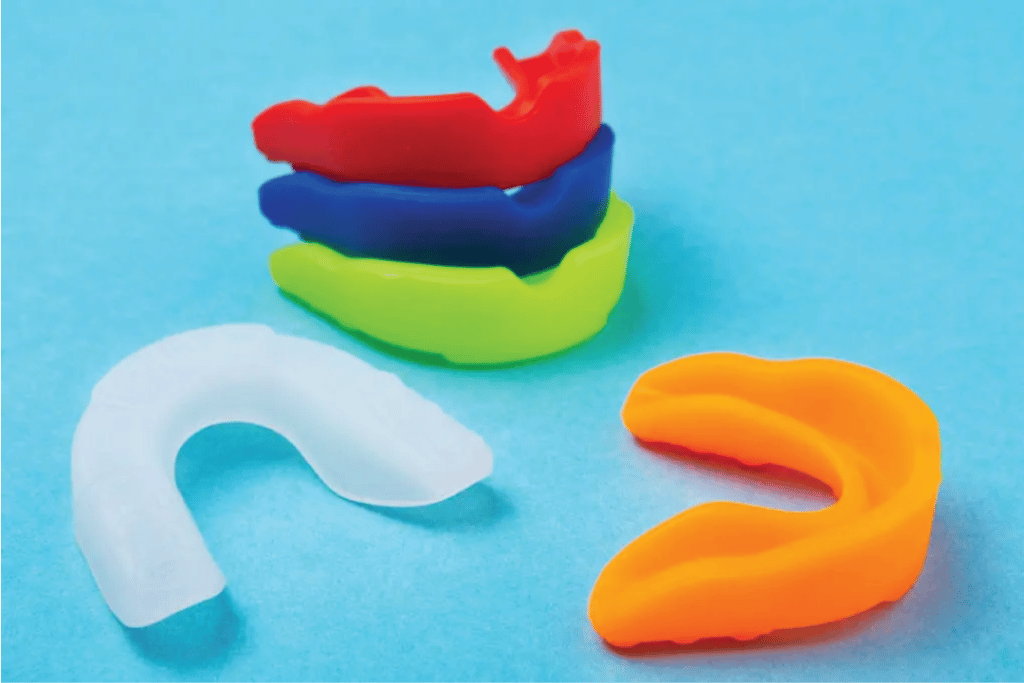Updated 4/4/2025
A mouthguard is a dental device that fits over your teeth to protect them—and the surrounding soft tissues like your tongue, lips, cheeks, and gums—from injury, impact, or damage. Though they’re often associated with sports, mouthguards also help prevent issues caused by nighttime teeth grinding and even sleep disorders like mild sleep apnea.

Your teeth are essential not just for chewing and speaking, but also for maintaining your facial structure and overall oral health. A mouthguard helps protect your teeth in situations where they’re at risk—from physical injury to excessive pressure.
Grind or clench your teeth (especially while sleeping)
Play contact sports like football, hockey, soccer, basketball, or baseball
Participate in high-risk activities like biking, ice skating, gymnastics, or skateboarding, where falls are common
Even kids and teens can benefit from using a mouthguard, especially during sports or if they’re wearing braces. Protecting baby teeth helps ensure proper development of adult teeth and jaw structure. For adults, mouthguards help preserve your only set of permanent teeth—keeping your smile intact and your dental expenses down.
Cuts to the lips, cheeks, and tongue
Chipped, cracked, or knocked-out teeth
Tooth nerve damage
Broken braces or orthodontic appliances
Mouthguards are especially critical if you wear braces, as the combination of metal and facial impact can cause serious soft tissue injury. A custom-fitted mouthguard from a dentist can protect both your mouth and your orthodontic hardware.
Mouthguards protect your teeth from damage caused by excessive pressure, grinding, or impact, reducing the intensity by absorbing some of the force and spreading it out across a greater area. A mouthguard for bruxism also keeps top and bottom teeth separated, reducing the effect of grinding and clenching.
Mouthguards can also help alleviate mild sleep apnea. Sleep apnea occurs when the tongue and jaw fall out of alignment while sleeping, closing off your airway and causing you to stop breathing temporarily. Sleep apnea is a potentially serious condition that can disrupt your sleep and negatively impact your overall health.
Although they also protect your teeth, sleep apnea devices primarily work by pushing the lower jaw and tongue forward so your airway remains open while you sleep. Some include a strap that goes around the head and chin to re-adjust the lower jaw for a similar effect. This can also help reduce snoring, which can also be a side effect of sleep apnea
Most mouthguards are designed to protect only the upper teeth because these teeth stick out slightly more than the bottom teeth and are at greater risk for impact, but if you require a mouthguard to alleviate bruxism or sleep apnea, or if you have braces, your dentist will likely recommend protection for both the top and bottom teeth.
Any mouthguard you choose should be comfortable, durable, and easy to clean, and it should not impede your breathing or speech.
Stock and boil-and-bite mouthguards will be less expensive and can be found at nearly any drugstore or sporting goods store, but they will offer less protection and fit less comfortably than a custom-fitted one. And if you have bruxism or sleep apnea, your dentist will recommend a custom-fitted mouthguard because they fit better, are more comfortable, and easier to keep in place, especially while you sleep.
Even with good oral hygiene, your mouth is an ideal place for bacteria to thrive. Mouthguards can not only pick up all of the bacteria from your mouth, but they can also develop some of their own if not cleaned properly. In addition to brushing and flossing your teeth before putting in a mouthguard, your mouthguard should be washed in warm soapy water and rinsed in cool water before and after every use, then allowed to air dry. (You can also brush your mouthguard as you would your teeth, with a toothbrush and toothpaste.) Your mouthguard should be kept out of reach of pets and out of extreme heat, including hot water or sunlight (heat can warp the mouthguard and change its shape, so it longer fits properly) and stored in a sturdy, vented plastic case when you are not using it.
Custom-fitted mouthguards can last several years before showing signs of wear or needing to be replaced, but stock and boil-and-bite mouthguards will need to be replaced more frequently. Children and teens will need to replace mouthguards more often to accommodate their growing teeth and mouth. To make sure your mouthguard is still fitting properly, bring it with you to your regular dental checkups. Your dentist will be able to tell you if and when you need to replace it.
The caring team of professionals at Dental Depot DFW is committed to protecting not just your teeth but your overall dental health. In addition to routine dental checkups, cleanings, and preventative care, you and your family can also visit us for the custom-fitted mouthguards you need to stay active and stay safe. With appointments available six days a week at any of our 5 DFW metro locations, we also make it fast, easy, and convenient for you to get your mouthguards and get on your way.
At Dental Depot DFW, we know that dental emergencies and injuries can happen even with the best protection, so we make sure you can receive the care you need when you need it with same-day emergency dental services and Saturday hours. And, thanks to a full staff of on-site specialists, we also provide all the services you need to fix the problem, all under one roof, from cosmetic dentistry and restorations like crowns or bridges to implants and facial trauma care.
With oral surgeons, periodontal specialists and orthodontists on staff, and dental clinics in: Arlington, McKinney, Aubrey, Highland Village, Lewisville, The Colony and Dallas, Dental Depot is here for all your dental needs.
Dr. Kana is dedicated in providing the highest level of care. He and the staff are committed to education and expanding knowledge. He has completed over 1,000 hours of continuing education. Dr. Kana hopes that being accessible to all of his patients, strong community feel and values, and strong patient/customer service is what will help our practice and community grow.
